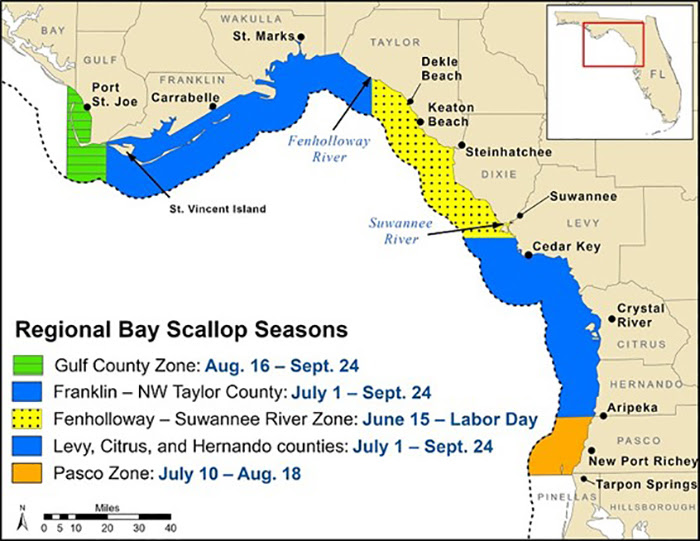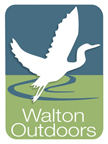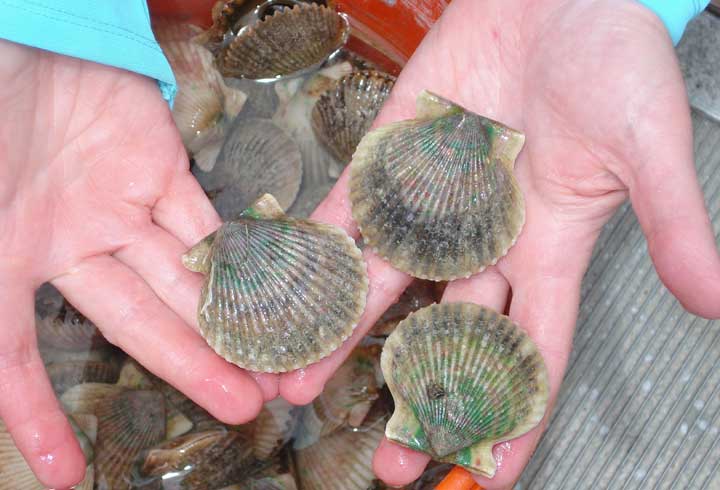The 2024 recreational bay scallop season in the Fenholloway – Suwannee River Zone opens June 15 and will remain open through Labor Day (Sept. 2). This includes all state waters in Dixie County, a portion of Taylor County including the towns of Keaton Beach and Steinhatchee, and a portion of Levy County.
The daily bag limit from June 15-30 in this area is 1 gallon of whole bay scallops in the shell or 1 cup shucked bay scallop meat per person, with a maximum of 5 gallons whole bay scallops in the shell or 2 pints (4 cups) shucked bay scallop meat per vessel.
From July 1 through Labor Day in this area the recreational limits are 2 gallons of whole bay scallops in the shell or 1 pint of bay scallop meat per person, with a maximum of 10 gallons of whole bay scallops in the shell or 1/2 gallon (4 pints) shucked bay scallop meat per vessel.
 Throughout the season and region-wide, vessel limits do not allow an individual to exceed their personal bag limit.
Throughout the season and region-wide, vessel limits do not allow an individual to exceed their personal bag limit.
Regional seasons:
Gulf County zone: Aug. 16 – Sept. 24
Franklin – N.W. Taylor County – July 1 – Sept. 24
Fenholloway – Suwannee River zone: June 15 – Labor Day
Levy, Citrus, Hernando Counties – July 1 – Sept. 24
Pasco zone: July 10 – Aug. 18
Harvest of bay scallops is permitted only by hand or by using a landing or dip net. Commercial harvest is prohibited.
For information on bay scallop regulations, visit MyFWC.com/Marine and click on “Recreational Regulations” and “Bay Scallops” under the “Crabs, Lobster and other Shellfish” tab.
Recreational harvesters need a Florida saltwater fishing license to harvest bay scallops unless they are exempt from needing a license or have a no-cost shoreline fishing license and are wading from shore to collect scallops (i.e., feet do not leave the bottom to swim, snorkel or SCUBA, and harvesters do not use a vessel to reach or return from the harvest location).
To purchase a Saltwater fishing license, visit GoOutdoorsFlorida.com, call toll-free 888-FISH-FLORIDA (888-347-4356) or purchase through the Fish|Hunt FL app on Apple and Android devices.
Boater and scalloper safety
A few things to remember that will make diving for scallops safe for divers and boaters alike:
• When scalloping in open water, divers should stay within 300 feet of a correctly displayed divers-down flag or within 100 feet of a divers-down flag if on a river, inlet or navigation channel.
• Always operate your boat at idle speed when traveling within 300 feet of a divers-down flag in open water or within 100 feet of a divers-down flag on a river, inlet or navigational channel.
For more information on boating safey, visit MyFWC.com/Boating, click on “Boating Regulations,” and select “Divers-down Warning Devices.”
Seagrass awareness
It is a violation of Florida law to damage seagrass beds in some areas within state waters. Boaters should avoid traveling through seagrass beds in shallow water, which can cause propeller scars, and should stay within the marked navigation channels whenever possible. Seagrasses are the principal food for endangered marine animals such as manatees and green sea turtles, act as natural filters to help purify the water, and serve as important habitat for a wide variety of marine life, like the bay scallop. For more information about seagrass awareness, visit MyFWC.com/Boating, click on “Boating Regulations,” and select “Seagrass Awareness.”
Stow it, don’t throw it
Do not discard scallop shells in inshore waters commonly used for recreational activities, such as near boat ramps or swimming areas. Piles of discarded scallop shells can create hazards for swimmers and damage seagrass habitat. Scallop shells can be discarded in a trash receptacle or in larger bodies of water where they are more likely to disperse. Also, don’t forget to stow your trash securely on your vessel so that it doesn’t blow overboard.

